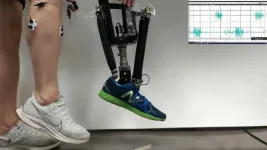(Press-News.org) (WASHINGTON) -- “What keeps you up at night?”
It’s a question Anthony Fauci, MD, heard repeatedly over the course of his nearly four decades as director of the National Institute of Allergy and Infectious Diseases at the National Institutes of Health.
Now a Distinguished University Professor at Georgetown University School of Medicine and the McCourt School of Public Policy, Fauci says he realized his worst nightmare -- a twist on the usual question -- in January 2020 when the type of virus he most feared triggered a worldwide pandemic.
Today, as the COVID-19 pandemic wanes, Fauci describes a new nemesis – lack of “corporate memory.”
Writing in Science Translational Medicine, as if to help ensure an indelible, collective memory is created, Fauci reviews the key lessons learned from COVID-19 to help prepare and respond to the next pandemic, “whenever that occurs.” (“What keeps me up at night” DOI 10.1126/scitranslmed.adj9469)
He describes two “buckets” for these lessons: the public health bucket and the scientific bucket.
“If there is a success story embedded in the COVID-19 saga, it is in the arena of basic, translational, and clinical science— the scientific bucket,” Fauci writes. He attributes the success to decades of investment in basic research, noting the scientific achievements of Drew Weissman, MD, PhD, and Katalin Kariko, PhD, awarded the 2023 Nobel Prize in Medicine or Physiology for their discoveries that enabled the development of effective mRNA vaccines against COVID-19.
Fauci also describes a possible path ahead for future scientific work involving prototype pathogen research.
Often perceived as the face of the public health response during the pandemic in the U.S., Fauci outlines failures that fall in the public health “bucket” ranging from institutional weaknesses to the disconnect between health care delivery and the public health infrastructure. Specifically, he notes poor coordination between state and governments, supply chain issues, and misinformation and disinformation.
“Fundamental to all this discussion is my comment above regarding the next inevitable pandemic, whenever that occurs,” Fauci concludes.
“Over and over, after time has passed from the appearance of an acute public health challenge, and after cases, hospitalizations, and deaths fall to an ‘acceptable’ level … the transition from being reactive to the dwindling challenge to being durably and consistently prepared for the next challenge seems to fall flat. Hopefully, corporate memory of COVID-19 will endure and trigger a sustained interest and support of both the scientific and public health buckets.
“If not, many of us will be spending a lot of time awake in bed or having nightmares when asleep!”
###
About Georgetown University Medical Center
As a top academic health and science center, Georgetown University Medical Center provides, in a synergistic fashion, excellence in education — training physicians, nurses, health administrators and other health professionals, as well as biomedical scientists — and cutting-edge interdisciplinary research collaboration, enhancing our basic science and translational biomedical research capacity in order to improve human health. Patient care, clinical research and education is conducted with our academic health system partner, MedStar Health. GUMC’s mission is carried out with a strong emphasis on social justice and a dedication to the Catholic, Jesuit principle of cura personalis -- or “care of the whole person.” GUMC comprises the School of Medicine, the School of Nursing, School of Health, Biomedical Graduate Education, and the Lombardi Comprehensive Cancer Center. Designated by the Carnegie Foundation as a doctoral university with "very high research activity,” Georgetown is home to a Clinical and Translational Science Award from the National Institutes of Health, and a Comprehensive Cancer Center designation from the National Cancer Institute. Connect with GUMC on Facebook (Facebook.com/GUMCUpdate) and on Twitter (@gumedcenter).
END
Robotic prosthetic ankles that are controlled by nerve impulses allow amputees to move more “naturally,” improving their stability, according to a new study from North Carolina State University and the University of North Carolina at Chapel Hill.
“This work focused on ‘postural control,’ which is surprisingly complicated,” says Helen Huang, corresponding author of the study and the Jackson Family Distinguished Professor in the Joint Department of Biomedical Engineering at NC State and UNC.
“Basically, when we are standing still, ...
A new study carried out in mice, led by Queen Mary University of London, has identified cells that drive the spread of pancreatic cancer and discovered a weakness in these cells that could be targeted using existing drugs. This offers a promising new approach for treating pancreatic cancer.
The research, published in Science Advances and funded by Barts Charity and Cancer Research UK, found that many patients' pancreatic cancer contains cells called amoeboid cells. These are aggressive, invasive ...
About 40,000 years ago, Neanderthals, who had lived for hundreds of thousands of years in the western part of the Eurasian continent, gave way to Homo sapiens, who had arrived from Africa. This replacement was not sudden, and the two species coexisted for a few millennia, resulting in the integration of Neanderthal DNA into the genome of Sapiens. Researchers at the University of Geneva (UNIGE) have analyzed the distribution of the portion of DNA inherited from Neanderthals in the genomes of humans (Homo sapiens) ...
A large, population-wide study of Denmark residents with type 2 diabetes shows that migrants typically face a greater risk of inferior care for their disease than native Danes, particularly when it comes to monitoring their disease and controlling biomarkers—managing blood levels of key substances that are associated with diabetes. Anders Aasted Isaksen of Aarhus University and Steno Diabetes Center Aarhus, Denmark, and colleagues present these findings in the open-access journal PLOS Global Public Health.
Prior research ...
As climate change warms the planet and droughts are anticipated to become more frequent and extreme, a new study reveals how reduced water flows and rising atmospheric temperatures are set to heat our rivers - creating major challenges for aquatic life, ecosystems, and society.
Water temperature is an important control for all the physical, chemical, and biological processes in rivers. It is particularly important for organisms that cannot regulate their own body temperature, such as fish. River temperature is important for human health and industrial, domestic, and recreational ...
ESMO calls on EU member states to adopt a five-year threshold for cancer survivors’ right to be forgotten when transposing the revised EU Consumer Credits Directive to their national legislation
The Society has been selected as one of the key stakeholders involved in the development of the EU Code of Conduct which seekS to ensure that advances in cancer care are reflected in the commercial practices of financial service providers
The ESMO Patient Advocacy Working Group aims to launch a pan-European campaign to illustrate to decision-makers the life-changing impact of a simple ...
A woman’s fertility normally decreases by her late 30s with reproductive function eventually ceasing at menopause. It is known that a small molecule called nicotinamide adenine dinucleotide (NAD+) plays a critical role in this decline, and Buck scientists have revealed how this happens and have identified potential new approaches to enhance reproductive longevity.
“Studying ovarian biology and reproductive aging is not just about trying to increase fertility, but really about the overall ...
Researchers at North Carolina State University and global collaborators have mapped the mosquito’s tree of life, a major step toward understanding important traits, such as how the insects choose their hosts, feed on blood and spread disease. The findings will help researchers make better predictions to model disease transmission and understand what makes some mosquitoes better disease carriers than others.
The research suggests that mosquito evolution over the past 200 million years mirrors the Earth’s ...
Antimicrobial resistance – occurring when pathogens can survive antibiotic treatment – is one of the most rapidly emerging global public health threats today. According to a 2022 study, nearly five million deaths were associated with antibiotic-resistant bacteria in 2019, with over a million deaths per year directly attributable to antimicrobial resistance.
In a new study, researchers from the Typas Group at EMBL Heidelberg have systematically profiled over 10,000 drug combinations for their effectiveness against common multidrug-resistant bacteria.
“Previously, ...
GRAND RAPIDS, Mich. (Oct. 18, 2023) — A new model developed by Van Andel Institute, Lund University and University of Florence scientists will enable researchers to better understand how Alzheimer’s disease progresses in the brain.
Like other neurodegenerative diseases, Alzheimer’s is challenging to study. It is immensely complex, develops over a long period of time and varies from person to person. Critically, scientists also lack non-invasive techniques to monitor disease progression in the human brain. Instead, they often rely on models that mimic the disease, allowing them to ...

